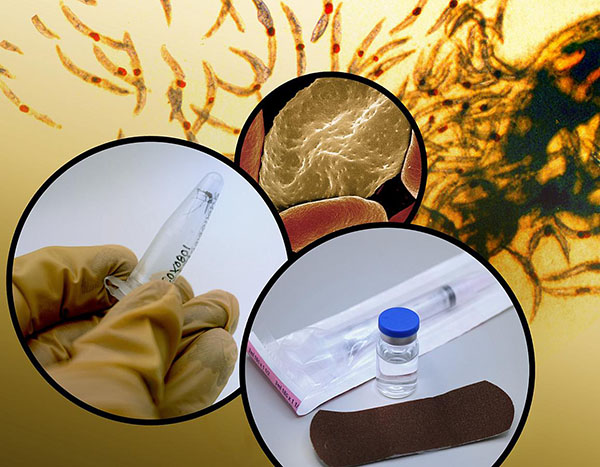Candidate malaria vaccine provides lasting protection in NIH-sponsored trials
Approach could have role in preventing malaria in pregnancy
Two National Institutes of Health (NIH)-supported trials of an experimental malaria vaccine in healthy Malian adults found that all three tested regimens were safe. One of the trials enrolled 300 healthy women ages 18 to 38 years who anticipated becoming pregnant soon after immunization. That trial began with drug treatment to remove malaria parasites, followed by three injections spaced over a month of either saline placebo or the investigational vaccine at one of two dosages. Both dosages of the vaccine candidate conferred a significant degree of protection from parasite infection and clinical malaria that was sustained over a span of two years without the need for a booster dose—a first for any malaria vaccine. In an exploratory analysis of women who conceived during the study, the vaccine significantly protected them from malaria in pregnancy. If confirmed through additional clinical trials, the approach modeled in this study could open improved ways to prevent malaria in pregnancy.
Spread by Anopheles mosquitoes, malaria parasites, including those of the species Plasmodium falciparum (Pf), can cause illness in people of any age. However, pregnant women, infants and very young children are especially vulnerable to life-threatening disease. Malarial parasitemia in pregnancy is estimated to cause up to 50,000 maternal deaths and 200,000 stillbirths in Africa each year.
The trials were co-led by investigators from the NIH’s National Institute of Allergy and Infectious Diseases (NIAID) and the University of Sciences, Techniques and Technologies, Bamako (USTTB), Mali. The investigational vaccine used in both trials was PfSPZ Vaccine, a radiation-attenuated vaccine based on Pf sporozoites (a stage of the parasite’s lifecycle), manufactured by Sanaria Inc., Rockville, Maryland. Multiple previous clinical trials of PfSPZ Vaccine have shown it to be safe, including in malaria-endemic countries such as Mali. In results published in 2022, for example, an NIAID-sponsored, placebo-controlled trial of a three-dose regimen of PfSPZ Vaccine in Burkina Faso found that the vaccine had up to 46% efficacy that lasted at least 18 months.
This page was last updated on Thursday, August 15, 2024
